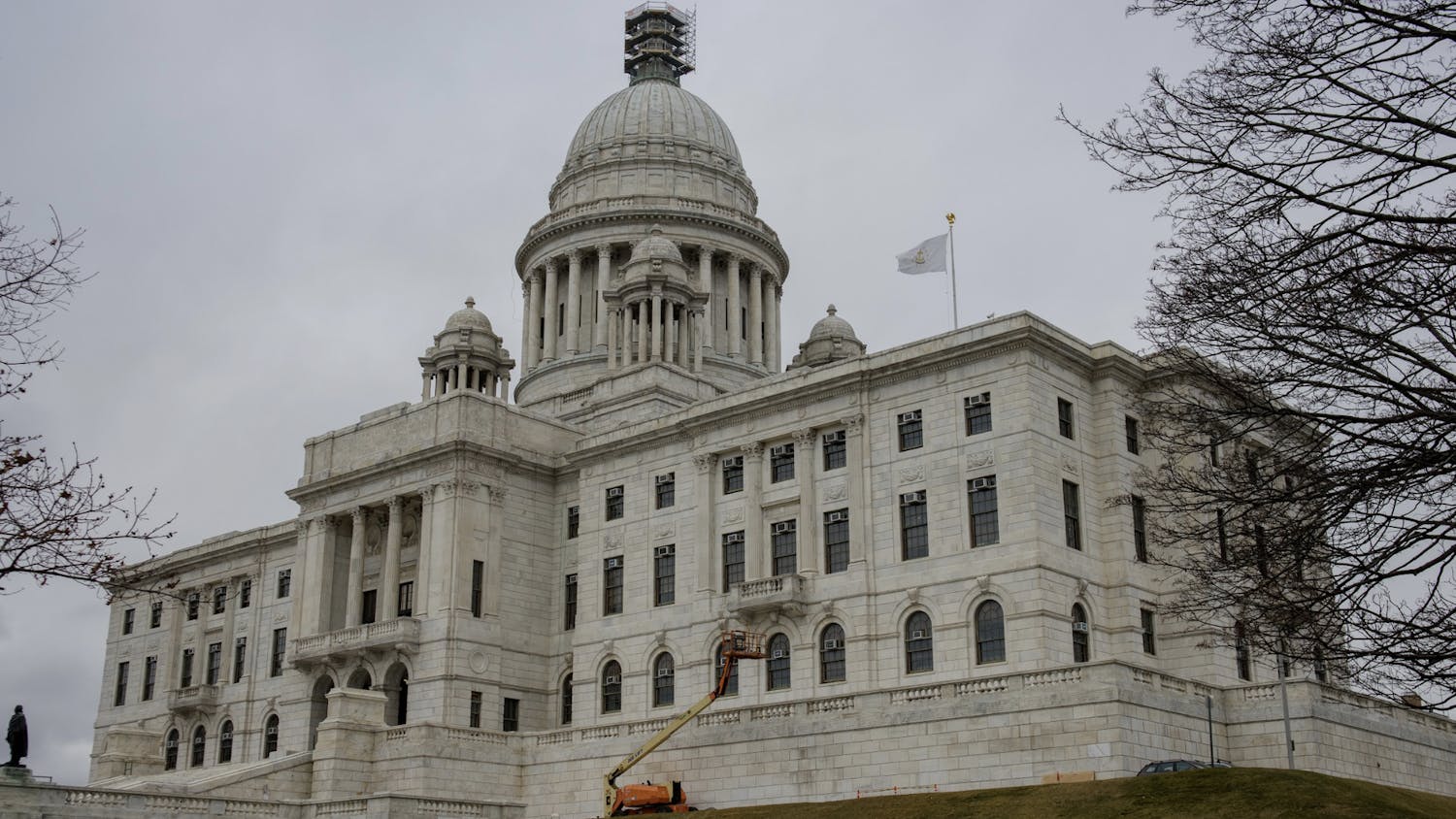Despite the University's perch atop College Hill, students have a long history of engagement with the Providence Public School District. With more than 60 outreach programs in local schools, Brown has a sizable presence within the district. But Rhode Island's education system is in dire straits, and schools are under more scrutiny than ever. Opinions vary as to how welcome University outreach is, and whether — distanced from overburdened schools — Brown can truly make a difference.
Establishing a connection
The Swearer Center for Public Service and its 450 volunteers spend up to 1,600 hours per week working in local schools, according to Roger Nozaki MAT'89, the center's director and associate dean of the College. The Swearer Center now has a presence in six major urban districts in Rhode Island. Nozaki said these programs try to maintain long-lasting relationships with schools, which Nozaki called a "critical" part of their efforts.
Nozaki said the first step in making an impact is building trust and credibility within the community. Many schools where the center organizes programs have improved noticeably in recent years. Students at William D'Abate Elementary School — where Swearer Center volunteers began tutoring and summer programs in 2008 — have shown a 14 percent rise in reading proficiency and a 20 percent increase in math proficiency since 2007, according to statewide standardized tests.
Nozaki clarified that the score jump was not directly related to the center's efforts, noting the school has also undergone curricular reform. But similar schools where the center does not have a presence have not shown improved numbers like these in such a short time period.
The Swearer Center maintains an "ongoing conversation" with schools and asks for feedback on a regular basis, Nozaki said. He added if a school no longer wanted the University's assistance, it would just need to ask — though in his time at the center, this has never happened.
Nozaki said one of the challenges of community outreach is the relatively short amount of time most students can commit to local schools. It "makes things tough," he said, but having the center's permanent staff — 18 full-time personnel — to help coordinate programs is helpful.
Many alums have gone on to work in local education, he added, citing multiple programs founded by alums that are dedicated to promoting arts and the humanities in Providence public schools. A group of graduates also founded the Learning Community, a charter school in Central Falls.
A school's perspective
Brent Kermen, principal of William D'Abate Elementary School, said the Swearer Center acts as a "fiscal agent" for a 21st Century Community Learning Center grant the school received through the Rhode Island Department of Education. "We are very, very fortunate and grateful to have all of the services that we receive through the Swearer Center," he said.
Kermen said 20 to 30 students help out before or after class time at the elementary school on a daily basis, and about 10 undergraduates run a summer program at the school.
The Swearer Center has been involved with the elementary school for at least 12 years, Kermen said. "They play a big role in our students' success here."
"Without their support and services, there's no doubt that our student achievement would not be where it is," he said. In addition to increased test scores, the elementary school has the third highest attendance rate in the district, he said.
Kermen added that he thinks Brown students' unfamiliarity with Providence is not a problem.
"I think they share a lot of their personal experiences and successes with our students. … I think our students feel that and sense that and it motivates them," he said. "The fact that we're Providence or that 95 percent of our students qualify for free and reduced lunch — which means 95 percent of our kids live in poverty — that gets lost. That all goes out the window with the Brown students."
Motivation from within
In the spirit of expanding its outreach to the community, the Urban Education Policy program established the Urban Education Fellows program five years ago. The program — which was created in response to the 2006 recommendations of the University Steering Committee on Slavery and Justice — grants a few graduate students free tuition each year in exchange for three years of service in local urban schools.
Kenneth Wong, director of the program and chair of the education department, said the fellows are "well received" by the community. He added that urban education students helped Rhode Island win a Race to the Top federal grant and received appreciation for their work from the mayor.
But according to Wong, there is a "general perception" in the community that the University is not doing enough.
"By nature, our work is more dispersed," he said. To combat this perception, Wong said the department is developing a website to showcase the over 60 projects the University is conducting in Providence public schools. The University appointed its first director of education outreach in April 2006 to oversee such coordination, but the Office of Education Outreach website has not been updated with contact information since its current director, Holly Harriel, began work February 2010.
Wong said the program's work in the community is going well but that it must not lose steam as it works to achieve its goal of granting the University an "ongoing presence" in the public school community.
From the top down
In addition to offering services in public schools, select students have also had the opportunity to interact with the city's education system from within the government.
Amit Jain '12 interned with City Councilman Samuel Zurier on negotiations concerning the Providence teachers union contract in recent months and presented his findings to the City Council. He began working for Zurier after the councilman contacted Ross Cheit, associate professor of political science and public policy, looking for an intern for this project.
Jain said Cheit told him to expect some "wisecracks" from the City Council for being an undergraduate intern from Brown. Though he never faced any of these personally, he said he could understand the basis for such jokes because he perceives an inherent stigma associated with the "Ivy League thing." But Jain said he thinks the stigma can be overcome as the University continues to broaden its positive impact on the community.
Zurier said the "wisecracks" Jain was warned about may be due to the University not paying city taxes on its property. In this rough economic climate, Zurier said some taxpayers feel that "the financials would be in better state if Brown were not exempt from paying taxes."
Brown can make a difference through its community efforts, Zurier said. "My sense is that there's actually quite a bit more that could be done," he said. "And I'm hoping to try to figure out ways to make the schools more open to contributions from Brown students and other college students, too." As of now, the Providence teachers' contract mandates that the position of club advisers must be filled by hired teachers. Zurier said this is a role he would like to see filled by students as well.
Rallying students
Some students are already working on filling this void. Zack Mezera '13 currently facilitates a club at Hope High School called Hope Student Union, which teaches students about activism and encourages them to voice concerns about issues at the school. Last year, Hope students staged a walkout to protest changes to the school's schedule and curriculum.
But it can be difficult as "white, affluent Brown students" to tell public school students to stand up for thems
elves, Mezera said. "There is a division between College Hill and the East Side," where Hope is located, he added.
He has heard criticism that undergraduate tutors are too transient. "I think (schools) are just used to seeing faces come in and out. I don't begrudge them for that," he said.
Bobby Hunter '12, who works with Mezera at Hope, accounted for this perception as an inherent trait of college students. "When you have a group of students that are as privileged and who have as many options as we do, there's going to be an inevitable tendency to really jump around until you find something that is a good personal fit, which is understandable," he said. "It's just kind of hard to keep in mind that there are always going to be people on the other side of that."
But by demonstrating their commitment, students can "break the barrier," Mezera said. He acknowledged that the University already has a number of successful programs in local schools. "I just think that for stronger change, we've got to get in deeper."
Mezera said he plans to stay in Providence after he graduates and continue the work he has started at Hope, as well as expand his project to other local high schools.
Student involvement helps overcome what Hunter considers the "biggest stereotype" — that Brown students are disinterested in local issues.
He said he would like to see more schools apply for money from the Fund for the Education of the Children of Providence, an endowment that gives money to local schools and was also created in response to the 2006 report on slavery and justice.
He added that Brown should consider reserving space for local students in the Summer@Brown program and work on making the University's resources even more available. "I don't think that we're actively not open," he said. "But the gates and the architecture and the geographic location all kind of contribute to a general sense (of being closed off) that is no one's fault but might take active steps to overcome."




